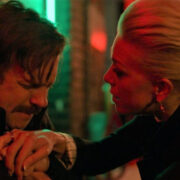HOT SUMMER NIGHTS: A Stylish Debut That Can’t Live Up To Its Own Promise

Tessa is a writer living in Boston, where she spends…
Hot Summer Nights owes a lot to the past. Elijah Bynum’s feature-length debut draws heavily from teen classics and crime dramas, but it’s not really any specific allusion that gives the movie its out-of-focus nostalgia. How could it be, when the allusions are so haphazardly drawn and indiscriminately deployed? Teenagers drink milkshakes, make out to David Bowie, bathe in the neon light of distant Ferris wheels, go to the arcade, quit their paper routes––it’s all here.
The story is set in 1991, but that doesn’t really matter. The only important thing is that it’s set in a winsome-yet-gritty version of the past, general enough that it might invoke amorphous wistfulness even with audiences born in 2001. We could be anywhere between The Perks of Being a Wallflower and Grease, and while this ambiguity has the potential to tilt us into something timeless and legendary, for the most part it just ends up being confusing.

Hot Summer Nights follows Daniel Middleton (Timothee Chalamet), a socially awkward teenager who is sent to live with his aunt in Cape Cod following his father’s death. Stuck between the townies and the summerbirds, he befriends another outcast: Hunter Strawberry (Alex Roe), a high-profile bad boy who spends his summers selling weed to the wealthy vacationers. After an encounter with Hunter’s sister, McKayla Strawberry (Maika Monroe), Daniel develops both a crush on McKayla and a sudden interest in joining Hunter in business. As Danny’s relationship with each of the Strawberrys unfolds, it becomes apparent that he will have to choose between them: McKayla hates her brother’s drug dealing, and Hunter has sworn to kill anyone who touches his sister.
Building Around A Shaky Core
It’s a bit challenging to give a succinct summary of Hot Summer Nights without immediately prodding at its shortcomings. This isn’t because the problems are unforgivable so much as it’s because they are so firmly situated around its basic development of plot and character––a fact that actually makes the film feel appealingly salvageable, if only the script could cycle through a few more drafts. I can feel the echo of undergraduate creative writing critiques banging around my head as I watch this movie, underlining words like “action,” and “plot,” and harping on Bynum to take another look at his character sheet.
In its final form, the film simply leaves too many unanswered questions. Why is Hunter so ferocious about who his sister dates, considering the siblings don’t seem to speak? Why does Daniel want to sell weed at all, once it becomes clear his initial desire to impress McKayla is irrelevant? Why does he want to intensify the business when neither Hunter nor McKayla thinks it’s a good idea, and he has no other apparent motivation? And what on earth makes this story noteworthy to the point that our unnamed, awestruck narrator whispers it to us like it’s the greatest kind of legend?

Danny and Hunter’s unclear motivations can be accounted for as simple weak character development (McKayla’s development is weak as well, but as she is less a character and more a prize, this isn’t quite so obvious), but the mystifying position of the narrator indicates an equally pervasive problem. This narrator, a young-ish teenage boy who is also apparently spending the summer on Cape Cod, remains unnamed and unseen until the final moments of the film. He functions mainly to inform the audience that the stakes are high and the action rising––an unfortunately necessary role, as none of this is signified organically.
Style at the Expense of Plot
The thing about nostalgia for the sake of nostalgia is that is doesn’t have anything to do with story. Bynum is engaging in a kind of aesthetic-first filmmaking, prioritizing style so highly it eclipses action. With this backwards approach, the development of character (and even of plot) is oddly abandoned, and Bynum is forced to tell, not show, in order to keep the action moving. Minor characters break the fourth wall to give their take on events, the narrator tells us that life will “never be the same,” and both romances and drug deals develop through soundtrack-heavy montage, leaving the audience excluded from what might be compelling dialogue.

These choices may look pretty enough, but they don’t do much. After a few hazy montage sequences, the details of the film’s landscape become vague enough to be distracting. During a climactic scene in a garage, I found myself wondering if the garage was attached to the Strawberry home, or if I had missed Hunter starting a part-time job at a local mechanic. I was already confounded by the geography, having spent a good portion of the film trying to figure out if the Strawberry siblings live together or apart, which surely wouldn’t matter if I wasn’t grasping at character-building straws.
Once you notice this tendency, little distractions start popping up everywhere. Have we seen Daniel’s aunt, in whose home he is supposedly living? Have we seen him in his room? Daniel has the same complexity and direction as a pinball, getting shot around New England without any appreciable goals. We never quite know our protagonist, and that’s a problem when it is his desires and actions that are bringing the plot to its climax.
Hot Summer Nights: Flashy and Enthusiastic, but Ultimately Hollow
Hot Summer Nights is, for the most part, dramatic nonsense that is stylish but not very good. The story is not adequately interesting to justify the legendary tone, and it winds up feeling anodyne when it should feel explosive. It doesn’t really feel worth attacking, but it also does not feel worth the price of a ticket.
Despite this, Elijah Bynum is a young filmmaker, and he clearly has a certain flair and enthusiasm. This film may not live up to its own promise, but it really tries, and that, at least, is enticing. I will be interested to see Bynum’s next project; maybe a story less concerned with cementing its own reputation will manage to impart a little more weight.
What are your thoughts on Hot Summer Nights?
Hot Summer Nights got a limited release on July 27th, 2018.
Does content like this matter to you?
Become a Member and support film journalism. Unlock access to all of Film Inquiry`s great articles. Join a community of like-minded readers who are passionate about cinema - get access to our private members Network, give back to independent filmmakers, and more.
Tessa is a writer living in Boston, where she spends her time eating falafel and falling asleep on public transportation. Her greatest personal goal is to learn how to allow someone to dislike horror films without trying to convince them they just haven't seen the good ones yet.










